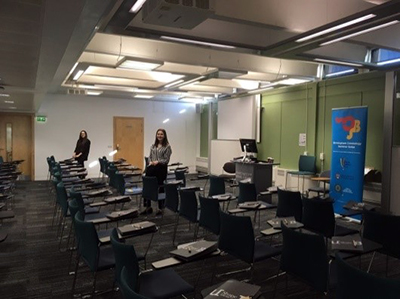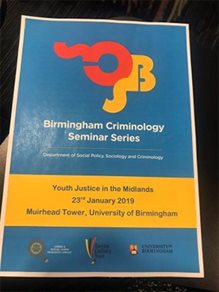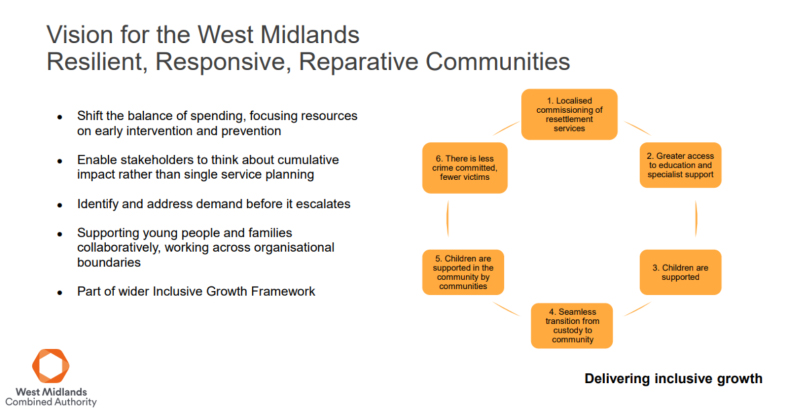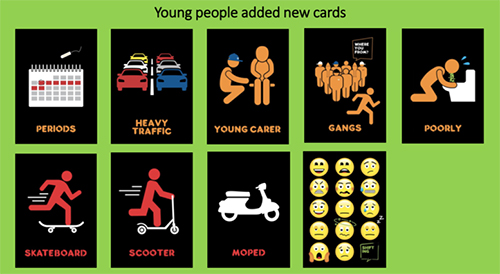Josie Broom and Maleeha Hussain
 On Wednesday 23 January the Department of Social Policy, Sociology and Criminology at the University of Birmingham held its first Barrow Cadbury sponsored Birmingham Criminology Seminar Series event to around 50 delegates from academia, the third sector and different public sector organisations including youth justice, policing and beyond. Following a delicious feast from ethical caterers the Real Junk Food Project Birmingham, we were ready to start!
On Wednesday 23 January the Department of Social Policy, Sociology and Criminology at the University of Birmingham held its first Barrow Cadbury sponsored Birmingham Criminology Seminar Series event to around 50 delegates from academia, the third sector and different public sector organisations including youth justice, policing and beyond. Following a delicious feast from ethical caterers the Real Junk Food Project Birmingham, we were ready to start!
We introduced the event alongside the event organiser and seminar series lead Dr Sarah Brooks-Wilson, then Lucy Parrish and Dina Skyia read out young people’s views and experiences of key event themes - a great place to start for a youth justice seminar! Young people reflected on how can they could be better listened to, whether it is easy to travel to YOT appointments, what could help keep them out of the youth justice system, and which issues a new Midlands Youth Justice Network should prioritise.
 Young people suggested that ‘self-governing groups like Youth Council which meet regularly’ would ensure that they are better listened to, and that practitioner ‘friendliness and open mindedness’ is important. Young people had many ideas about what a new Midlands Youth Justice Network should prioritise including: ‘safe sex, abortion, listening to parents, peer pressure, drugs and alcohol jobs, money management and how to stay out of trouble’, and that young people should be ‘listened to’ and have ‘more places to go and do interesting activities’ to help stay out of the youth justice system. Hearing these views was important, in helping us reflect on how youth justice could best serve those most affected. We then split into two separate streams – one focusing on youth justice issues and the other on responses.
Young people suggested that ‘self-governing groups like Youth Council which meet regularly’ would ensure that they are better listened to, and that practitioner ‘friendliness and open mindedness’ is important. Young people had many ideas about what a new Midlands Youth Justice Network should prioritise including: ‘safe sex, abortion, listening to parents, peer pressure, drugs and alcohol jobs, money management and how to stay out of trouble’, and that young people should be ‘listened to’ and have ‘more places to go and do interesting activities’ to help stay out of the youth justice system. Hearing these views was important, in helping us reflect on how youth justice could best serve those most affected. We then split into two separate streams – one focusing on youth justice issues and the other on responses.
Issues Stream
Claire Dhami from the West Midlands Combined Authority started by talking about child poverty, trauma and justice. Claire highlighted the problems in the West Midlands such as higher reoffending rates and funding cuts for YOTs. It was also suggested that ticking a box can be ineffective for recording trauma as there may be complex factors and radical experience differences. For example, ticking the ‘child witnessing death’ box may meaning anything from witnessing death and having the support of a family, to witnessing both parents being murdered, to adopted family break down. It was then our turn! Claire asked us to help create some new policies on the themes of first time entrants into the system, work with children in the system, children beyond their 18th birthday and governance. Claire then outlined her vision for the West Midlands, with a focus on early intervention and supporting young people and their families.
 Then Manila Nicholas from the Youth Justice Board delivered her session Ethnic Disproportionality in the Youth Justice System. Contextual factors were described as important when looking at these statistics. For example, young people from BAME backgrounds are more likely to live in inadequate housing and areas characterised by poverty, and are more likely to be diagnosed with mental ill health and to experience poor outcomes from treatment. Manila then explained how the YJB are trying to resolve these problems by creating strategies to improve trustworthiness, with a focus on prevention and diversion strategies, and the improvement of positive outcomes. Usefully, we then took part in some group work to discuss further solutions to these problems.
Then Manila Nicholas from the Youth Justice Board delivered her session Ethnic Disproportionality in the Youth Justice System. Contextual factors were described as important when looking at these statistics. For example, young people from BAME backgrounds are more likely to live in inadequate housing and areas characterised by poverty, and are more likely to be diagnosed with mental ill health and to experience poor outcomes from treatment. Manila then explained how the YJB are trying to resolve these problems by creating strategies to improve trustworthiness, with a focus on prevention and diversion strategies, and the improvement of positive outcomes. Usefully, we then took part in some group work to discuss further solutions to these problems.
Responses Stream
Ruth Searle from the Youth Justice Board started by providing a detailed discussion on the professionalisation of youth justice through a new Workforce Development Strategy. There was a particular focus on professionalisation and specialist skills, to empower and train those working with complex young people who have offended. Then, Dr Laura Kelly from the University of Birmingham discussed prevention and diversity. Compared with other forms of diversion, it was evident from the discussed research that most of the YOTS were involved with intervention plans to keep young people out of the formal justice system. Laura raised an important question on whether the focus should just be on young people’s criminal records or also on work carried out behind the outcome.
 Then Dr Sarah Brooks-Wilson described the importance of young people’s service access problems, raising questions about the need for different sorts of support. She shared the new visual resource ‘Shifting Journey Cards’ from her current ESRC impact project, which was co-produced with young people. The interactive visual resource was designed for practitioners and young people to use to enhance practice conversations about journey making and service accessibility problems . Young people can struggle to access appointments and communicate journey barriers due to mental health, limited literacy and timekeeping skills, making shifting journey cards a useful resource.
Then Dr Sarah Brooks-Wilson described the importance of young people’s service access problems, raising questions about the need for different sorts of support. She shared the new visual resource ‘Shifting Journey Cards’ from her current ESRC impact project, which was co-produced with young people. The interactive visual resource was designed for practitioners and young people to use to enhance practice conversations about journey making and service accessibility problems . Young people can struggle to access appointments and communicate journey barriers due to mental health, limited literacy and timekeeping skills, making shifting journey cards a useful resource.
Addressing all of the delegates, the West Midlands Police Counter Terrorism Unit gave a presentation on youth radicalisation. They described how the internet has shortened the radicalisation period, with the average age of those involved becoming lower. Nikki Fowler from the NHS then delivered a case study, describing the impact of mental health on radicalisation and terrorism. Interestingly, she described connections between poor mental health in young people and other factors such as homelessness or substance misuse.
We then finished with an engaging keynote talk from Professor Steve Case on the promotion of children’s strategic voice through ‘positive’ youth justice. Steve highlighted problems engaging with children from the Crime and Disorder Act 1998 onwards. Steve drew on evidence from his work in Swansea with Kevin Haines to argue that children should come first and the responsibility should be on adults to facilitate this.
Overall, we had such a fantastic day and really enjoyed listening to our speakers and our delegates views.
Josie Broom and Maleeha Hussain